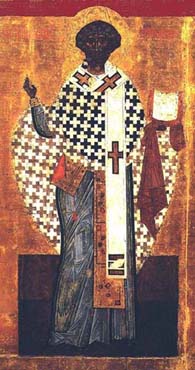December 5, Clement of Alexandria, Teacher and Apologist, 213 [?]
 Titus Flavius Clements (later known as Clement of Alexandria) was born into a pagan Athenian family which valued learning and education. He was highly educated and well trained in classical philosophy. Upon his conversion to Christianity he began to seek out teachers, wandering from Greece to Magnae Graecia and then to the east to study under Assyrian, Palestinian and Hebrew Christian teachers. He ended up in Alexandria where he came to study at the Catechal School of Alexandria under Pantaenus, the dean of the school. With several periods of exile during times of persecution he remained in Alexandria and succeeded Pantaenus as the dean of the Catechal School.
Titus Flavius Clements (later known as Clement of Alexandria) was born into a pagan Athenian family which valued learning and education. He was highly educated and well trained in classical philosophy. Upon his conversion to Christianity he began to seek out teachers, wandering from Greece to Magnae Graecia and then to the east to study under Assyrian, Palestinian and Hebrew Christian teachers. He ended up in Alexandria where he came to study at the Catechal School of Alexandria under Pantaenus, the dean of the school. With several periods of exile during times of persecution he remained in Alexandria and succeeded Pantaenus as the dean of the Catechal School.Clement worked to combine the best of pagan Greek and Roman learning & science with the Christian faith. He saw it his task to demonstrate to pagans that Christianity was intellectually respectable and philosophically rigorous, and to Christians that Christianity was not only for the uneducated, but that Christians must no longer "fear philosophy as children fear a scarecrow." He was willing to go far in his affection for the Greek philosophers as to say that "the Law is for the Jew what philosophy is for the Greek, a schoolmaster to bring them to Christ." For Clement the Greek philosophers understood the truth revealed in God’s creation. God had, in fact, planted seeds of the Truth in all rational creatures, though these seeds were not sufficient to bring them to divine truth. [Stromata]
One of the key debates within the Alexandrian religious community concerned the teachings of the Gnostics who held that the essence of Christianity was a a secret knowledge passed down from initiate to intiate. Clement did not condemn the Gnostics outright, though he did dissent from their denigration of the physical. For him evil was not merely the failure to subordinate the body to the mind. Instead he argued that the Gnostics had gotten their gnosis [the Greek word for knowledge] wrong. Orthodox Christianity held the true gnosis, the Gnostic gnosis was false. This implied for Clement, that there was very much about Christianity that was philosophical and intellectual, and at times he stated that ignorance was in fact worse than sin.
Today this prayer is said by many in the Church:
O God of unsearchable mystery, who led Clement of Alexandria to Find in ancient philosophy a path to knowledge of your Word: Grant that your Church may recognize true wisdom, wherever it is found, knowing that wisdom come from you and leads to you; through our Teacher Jesus Christ, who lives and reigns with you and the Holy Spirit, one God, for ever and ever. Amen.
_________
Source: http://www.bethel.edu/~letnie/AfricanChristianity/EgyptTheologiansClement.html

0 Comments:
Post a Comment
<< Home